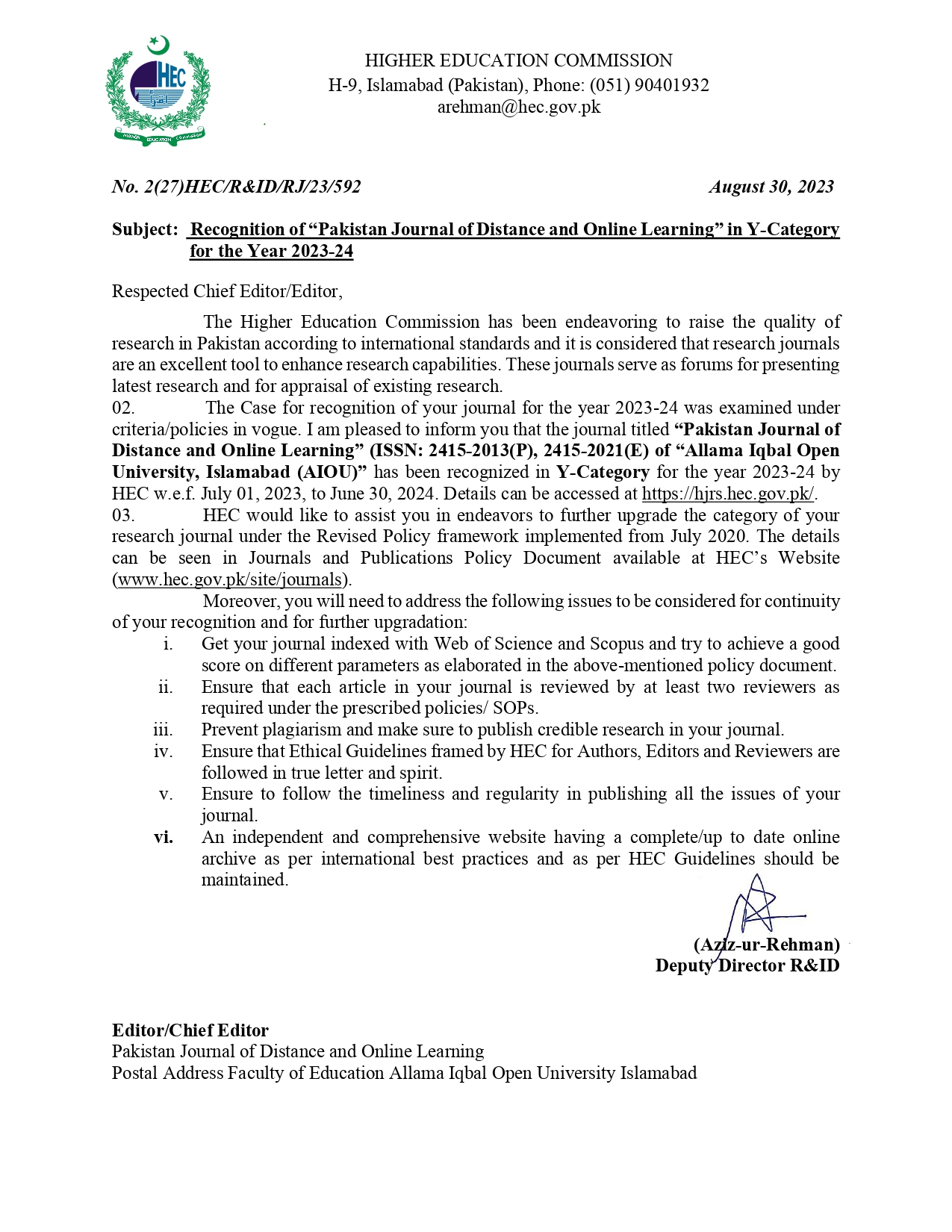Assessing the Readiness of Kenyan Universities for Online Education During COVID-19 Pandemic
DOI:
https://doi.org/10.30971/pjdol.v10i1.2225Keywords:
COVID-19, universities, Learning Management System (LMS), computer literacy, online educationAbstract
This study was based on online university education during the COVID-19 period in Kenya. The purpose of the study was to establish the readiness of Kenyan universities for online education during COVID-19 period. Online survey method generated data from 11 universities through content analysis. The data were analyzed qualitatively and interpreted. The major findings showed that majority of the universities under study adjusted in different ways during the COVID-19 period by hiring more teaching staff to teach online, however, the capacity of these job applicants to competently teach online courses was not clearly verified before they were hired to teach at the university. The study also found that even though majority of the universities had a functional Learning Management System (LMS), its utilization was below par. The study concluded that many universities did not offer quality online education as required by the Commission of University Education (CUE) in Kenya but were using online education language for marketing and sustainability purposes. To reduce the digital gap in institutions of higher learning, the study recommended that all teaching staff at the university level must be computer literate.
References
Alsayed, R. A., & Althaqafi, A. S. A. (2022). Online Learning during the COVID-19 pandemic: benefits and challenges for EFL students. International Education Studies, 15(3), 122-129. Received March 29, 2024: chrome-extension://efaidnbmnnnibpcajpcglclefindmkaj/https://files.eric.ed.gov/fulltext/EJ1345301.pdf
Barasa, P.L. (2021). Digitalization in teaching and education in the context of COVID-19: Kenya. Retrieved October 29, 2022: https://www.ilo.org/wcmsp5/groups/public/---ed_dialogue/---sector/documents/publication/wcms_783728.pdf
Biscaye, P. E., Egger, D. T., & Pape, U. J. (2022). Balancing work and childcare: evidence from COVID-19 school closures and reopenings in Kenya. Retrieved March 29, 2024: chromeextension://efaidnbmnnnibpcajpcglclefindmkaj/https://papers.pierrebiscaye.com/BEP_KenyaSchoolClosures.pdf
Busch, Carol, Paul, S., Maret,D., Flynn,T., Kellum, R., Le, S.,et al. (2005). Content Analysis. Writing@CSU. Retrieved September 30, 2022 https://writing.colostate.edu/guides/guide.cfm?guideid=61
Coleman, V. (2021). Digital divide in UK education during COVID-19 pandemic: Literature review. Research Report. Cambridge Assessment.
Culala, H.J.D. (2022, March). The “New Normal” in Education and the Future of Schooling. Paper presented at the 2ndEconomics, law, Education and Humanities International Conference at Institute of Education, Far Eastern University, Philippines. Retrieved October29,2022: 10607-Article Text-50406-1-10-20220322.pdf
Ghavifekr, S., Kunjappan, T., Ramasamy, L., & Anthony, A. (2016). Teaching and learning with ICT Tools: issues and challenges from teachers' perceptions. Malaysian Online journal of educational technology, 4(2), 38-57.
IMF (2022). Policy Responses to COVID-19. Retrieve from:https://www.imf.org/en/Topics/imf-and-covid19/Policy-Responses-to-COVID-19
Kenya. CUE (2022). Universities authorized to operate in Kenya. Retrieved 27, 2022 from https://www.cue.or.ke/index.php? option=com_content&view=article&id=21&Itemid=475
Kenya. CUE (2020). Format for preparing a self-assessment report for open, distance and e-learning (Odel) programmes and institutions in Kenya. Retrieve from https://www.cue.or.ke/index.php? option=com_phocadownload&view=category&id=73:sar-tool-for-odel-programmes-and-institutions-in-kenya&Itemid=529
Kenya. CUE (2014). Universities standards and guidelines, 2014. Retrieved September 30, 2022 from https://www.cue.or.ke/ index.php?option=com_phocadownload&view=category&id=8&Itemid=494
Ng’ang’a, T.K. (2021). Impact of COVID-19 measures on Kenya’s education sector. Retrieved September 30, 2022 https://www.africaportal.org › documents › AERC
Osubwa, W. (2022). Coming to terms with COVID-19 reality in the context of Africa’s higher education: Challenges, insights, and prospects. Retrieve from https://www.frontiersin.org
Omito, O. (2021). Status of digital literacy programme in public primary schools inHoma Bay County, Kenya. East African Journal of Education Studies, 4(1), 37-47.https://doi.org/10.37284/eajes.4.1.443
Omito, O., Kembo, J., Ayere, M., & Ali, A. A. (2019). Teachers’ computer capacity in public primary schools in Homa Bay County, Kenya: The case of the digital literacy programme.European Scientific Journal, Volume 15(19).
Pomerantz, J., & Brooks, D. C. (2017). ECAR study of faculty and information technology. (Vol. 97, No. 80, p. 94). Retrieved from https://benchmarks.it.unt.edu/sites/default/files/facultyitstudy2017.pdf
UNESCO (2021). Exploring the impact of COVID-19 in learning in Africa. Retrieve from https://en.unesco.org/news/exploring-impact-covid-19-learning-africa
United Nations (2020). Impact of the Covid-19 pandemic on trade and development transitioning to a new normal. Retrieved September 30, 2022 https://unctad.org/system/files/official-document/osg2020d1_en.pdf
University of Essex. (2021). Permanency and promotion criteria for academic staff. Retrieved June 14, 2023 from https://www.essex.ac.uk/
USA.Department of Education. (2021). Education in a pandemic: The disparate impacts of COVID-19 on America’s students. Retrieve from https://www2.ed.gov/about/offices/list/ocr/docs/20210608-impacts-of-covid19.pdf
Singh, K. Y. (2010). Research Methodology. New Delhi: A. P. H Publishing Corporation.
Sofradzija, H., Sehic, S., Alibegovic, A., Bakic, S.,&Camo, M. (2021). Education as a process and result. International Journal of Contemporary Education, 4(1). Retrieved September 30, 2022 from https://www.researchgate.net/publication/350093818_Education_as_a_Process_and_Result/link/6050b298a6fdccbfeae5dead/download
Tolmie, A., Muijs,D., & McAteer, E. (2011). Quantitative Methods in Educational and Social Research using SPSS. Berkshire. UK: Open University Press.
Vedder, A. H. & Wachbroit, R. (2015). Reliability of information on the internet: Some distinctions. Retrieved September 27, 2022 from https://www.researchgate.net/publication/254809604_Reliability_of_Information_on_the_Internet_Some_Distinctions/link/555b275808aeaaff3bfbd81d/download
Downloads
Published
How to Cite
Issue
Section
License
Authors may photocopy and use their articles without any permission/fee for noncommercial purposes as specified by the Creative Commons Attribution-NonCommercial 4.0 International License. For using work for commercial purpose, please contact on editor.pjdol@aiou.edu.pk .









